The difference between average salespeople and good ones is staggering. Average reps hit their quota —most of the time — while good ones don’t just consistently hit, they have blow-out months and quarters.

Good reps earn their prospects’ admiration, loyalty, and referrals. They skillfully handle objections and preemptively surface concerns to make them disappear.
If you want greatness, good news. Following these rules of good sellers will help you become one of the top-selling salespeople on your team — or even company.
![Download Now: Sales Conversion Rate Calculator [Free Template]](https://no-cache.hubspot.com/cta/default/53/059a7eef-8ad9-4bee-9c08-4dae23549a29.png)
What makes a good salesperson?
A good salesperson has more to offer customers than an exciting pitch —they’re enthusiastic individuals with resilience and they take the time to get to know their customers’ needs, show empathy, and deal in a product in confidence. They also know how to handle rejection, and learn from both their most successful deals and ones lost.
Most sales reps don't become rockstars over night. It takes a lot of time, effort, and continuous improvement to be successful in sales. However, there are a few common characteristics that every good salesperson has. Let's explore.
Traits of a Good Salesperson
- Delightful
- Enthusiastic
- Analytical
- Resilient
- Attentive
- Thorough
- Empathic
- Confident
- Adaptable
- Committed
Delightful
Being a good salesperson goes far beyond just making sales. You have to build strong relationships with your customers, which starts by making a positive first impression. When meeting with a new customer, make sure you have a well-put-together appearance and an inviting demeanor.
As a salesperson, you should go the extra mile. Take the time to understand your customers’ needs, preferences, and pain points. Then, tailor your approach and recommendations to their specific situation, showing that you genuinely care about solving their problems.
Enthusiastic
Being a good salesperson means you’ll put in the work, even when it gets tough. Having motivation to get the job done shows that you are passionate.
Sharing your personal excitement about why your product is valuable can make all the difference. When engaging with prospects, let your belief in your product shine through your words and actions. Although genuine enthusiasm cannot be faked, it doesn’t hurt to intentionally speak with energy and excitement while maintaining an open posture and eye contact.
Analytical
While friendliness is a good trait, you have to let your customers know you’re prepared, too. Customers want to make deals with salespeople who are dependable, fact-driven, and likely to ask questions and deliver answers they’re looking for.
Take the time to analyze your company’s sales data, customer trends, and market information. Not only will this enable you to understand your customers’ needs better, but it will also help you identify ways to refine your sales strategy over time.
Resilient
The sales profession can be challenging. You deal with constant rejection and varying sales numbers. However, these setbacks don’t deter good salespeople — they motivate them.
Instead of getting discouraged, look at challenging situations as opportunities for learning and growth. Turned down by another prospect? Don’t take it personally and focus on your next opportunity. Falling behind on your sales targets? Rethink your game plan and get back to work.
Attentive
As a salesperson, you know that each customer has different needs. Tending to those needs can help you build stronger relationships with your customers, foster loyalty, and open the door for future opportunities.
To better understand your customers’ needs, actively listen to them, pay attention to their verbal and nonverbal cues, ask them relevant questions, and be fully present in conversations. By doing this, you can gather important information, uncover pain points, and identify opportunities that can help you create a deal they’ll value.
Thorough
A good salesperson should be an expert in what they’re selling. You wouldn’t buy a car from someone who can’t tell you anything about its mileage or safety features, would you? Demonstrating that you’re knowledgeable makes you more reputable in the eyes of customers.
By being thorough, you can identify and address potential concerns or objections upfront. Customers appreciate thoroughness as it shows professionalism, reliability, and a commitment to delivering exceptional service.
Empathic
Connecting to your customers’ emotions can tell you what they really want from a sale. By appealing to their sentiments, you can meet their needs in new ways.
Put yourself in your customers’ shoes and consider the challenges they face. By having genuine concern for your customers’ needs — and addressing them effectively — you show that you’re actually committed to their best interests and not just trying to make a sale.
.png)
Free Sales Closing Guide
An easy-to-use sales closing guide with three tactics you can use right away.
- Using an ROI calculator for your prospects
- How to ask confirmation questions
- Sales question templates you can use today
- And more!
Confident
This may seem obvious, but being confident in your product or service can make your customers feel more confident in it, too. The same can be said for how confident you are in yourself.
The more confident you are, the more persuasive you are. You’re able to clearly articulate your value proposition and negotiate deals with conviction, all while making customers feel more secure in their purchasing decision.
Just remember, confidence is not about being pushy or overly assertive. You have to have the right balance of knowledge, preparation, and empathy to build trust with customers.
Adaptable
Sales is a pretty volatile profession, and good salespeople are adaptable to those changes. Being able to pivot your approach, or manage time shifts are very useful skills in this field.
Every customer and sales situation is unique. As an adaptable salesperson, you have to quickly read cues, pivot your sales techniques, and find common ground.
Committed
Good salespeople aren’t quick to give up, even in the face of challenges and rejections. It’s a tough profession, but those who are hungry to succeed will strive toward their goals.
Being committed also means going above and beyond for your customers, delivering on promises, and following up to provide exceptional service. You also have to continuously improve your skills and stay up-to-date with industry trends.
Understanding the qualities that a good salesperson has is only the first step, and to become an effective one takes practice. The following list is divided into three sections: selling habits, tips, and life habits good salespeople share. Improve your strategy and become an effective salesperson with these tools.
How to be a Good Salesperson
- Identify and stick to your buyer personas.
- Use a measurable, repeatable sales process.
- Know your product.
- Review your pipeline objectively.
- Find shortcuts and hacks.
- Practice active listening.
- Work hard.
- Follow up.
- Personalize your message.
- Shadow your peers.
- Practice your people skills.
- Be a team player.
- Know when to walk away.
- Be honest.
- Always solve for the customer.
- Roll with rejection.
- Always ask for referrals.
- Stay Balanced.
- Take breaks.
- Get eight or more hours of sleep.
- Believe in what you’re selling.
- Identify your strongest motivator.
- View your customer’s success as your own.
- Build personal relationships.
- Prepare ahead of time.
- Look for potential customers wherever you go.
Selling Habits of Effective Reps
1. Identify and stick to your buyer personas.
A clearly defined buyer persona is crucial to an effective sales process. And, a sales rep who sticks to that persona is effective in generating sales. Otherwise, a salesperson might fall back on spray-and-pray tactics that result in inefficient prospecting.
An effective rep researches the prospect to make sure they’re a good fit. They stick to their ideal buyer persona and know exactly whom they're selling to and why.
Further Reading: 20 Best Buyer Persona Questions to Ask Customers [Free Template]
2. Use a measurable, repeatable sales process.
Low-performing reps let intuition guide them. High-performing reps use a process that’s optimized to move as many prospects as possible from “connect” to “close.”
Low-performing reps sometimes let things slip through the cracks. High-performing reps know the state of every deal in their pipeline, what actions they’ll take next, and when. Low-performing reps rarely analyze results — because they haven’t been tracking them. High-performing reps obsessively review key metrics and adjust as necessary.
![]()
TL;DR: To be extraordinary, you need a consistent process. HubSpot has a free Key Performance Indicator template if you want somewhere to begin.
Further Reading: The Ultimate Guide to Creating a Sales Process
3. Know your product.
Being able to sell is half the battle. Understanding what you’re selling is the other (often under-appreciated) half.
In the old days, selling relied on charm and snake-oil tactics. But now that prospects have more access to information than ever before, they’re not fooled so easily. To gain their trust and add value to their lives, you have to truly know your product and why it’s valuable to your prospect.
Further Reading: Product Knowledge: How to Train Sales on the Thing They're Selling
4. Review your pipeline objectively.
Effective sales reps don’t mark a deal as “likely to close” because the influencer likes them. They’re able to objectively review opportunities, avoid happy ears, and come up with accurate sales forecasts.
Further Reading: Sales Pipelines: A Comprehensive Guide for Sales Leaders and Reps
5. Find shortcuts and hacks.
Once a great salesperson finds a strategy or technique that works, they use it — again and again and again and again, until it stops working.
This is smart. Reps are always working against the clock, which means the more time they spend experimenting, the less time they have for true selling. Plus, there’s an opportunity cost. Try one thing that doesn’t work, and you’ve missed the opportunity to use something that does.
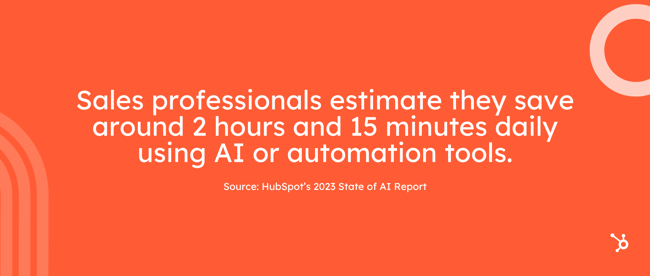
I’m not suggesting you should never change up your approach. Just do so selectively, and get results ASAP so you can either implement the tactic or move on.
Further Reading: Strategies to Maximize Your Sales Productivity
6. Practice active listening.
Successful salespeople are completely present when they talk to prospects. They’re not thinking about another deal, scrolling through Reddit threads, or sending funny memes to their team members. They’re engaged — and as a result, their conversations with buyers are deeper and more meaningful.
Active listening may be one of the hardest skills to develop since it’s human nature to care more about what you have to say than your prospect. However, it’s incredibly valuable. Not only will you build stronger relationships, but you’ll unlock information that’ll help position your product as the best option.
Further Reading: Active Listening in Sales: The Ultimate Guide
.png)
Free Sales Closing Guide
An easy-to-use sales closing guide with three tactics you can use right away.
- Using an ROI calculator for your prospects
- How to ask confirmation questions
- Sales question templates you can use today
- And more!
7. Work hard.
It’s 5 p.m. on the last day of the month or quarter. The B players have already left the office — they’re at a bar, celebrating because they all met quota. The C players are still in the office — they’re sending off last-ditch email attempts to prospects they haven’t engaged with in weeks.
The A players are in the office, too. They’ve already hit, but they’re still sending emails, scheduling meetings, and making calls. And, by laying the foundation for a great month before they need to, they always blow their goals out of the water.
Further Reading: 70 Quotes About Hard Work That’ll Help You Reach Your Goals
8. Follow up.
Many salespeople fail to effectively follow up after sending a proposal. They don’t even know if the prospect opened their email.
HubSpot Sales helps with this issue, letting salespeople know when and how often a prospect opens an email. With this information, they can follow up at the optimal time.

Further Reading: The Ultimate Guide On How To Write A Follow-Up Email
9. Personalize your message.
Instead of following a script and approaching each prospect with a “one-size-fits-all” mentality, high-performing salespeople are committed to learning as much as they can about a prospect to tailor their message. These sales reps understand the unique pain points their prospect is facing and can explain why their product is a good fit.
As Lauren Kennedy, Founder of Coastal Consulting, puts it, "We consistently see that high-performing sales professionals focus in on both the emotional component and necessary outcomes from the start of the sales process. Meaning, how will this product improve the customers' life? And, what tangible results will our product provide them? Offering an empathetic view on tangible results creates a unique sales process founded on relationship-building that places you above the competition."
Further Reading: Is Personalizing Your Sales Emails Worth It, According to Data?
Tips to Become a Better Salesperson
10. Shadow your peers.
Want to improve your objection handling? Identify the salesperson who's best at it within your company and ask if you can shadow a few of their calls. Learning from your peers is a great way to get better at your job while building strong relationships with your coworkers.
Further reading: Why Coachability Is Key to Sales Success
11. Practice your people skills.
Excellent small talk is a learned skill — and one that's crucial to salespeople's success. Whether you're at a housewarming party or a networking event, practice making other people feel at ease. Notice what makes them open up, zone out, and laugh, and take what you learn back to the office.

Further reading:
How to Make the Most of Sales Networking – Tips, Mistakes, and Examples
How to Network Remotely in Sales [+ Tips]
12. Be a team player.
So much of sales pop culture glorifies the lone wolf. But the best salespeople know it takes a village to build a career and a successful sales team. Help your colleagues, and know when to ask for help — that's the key to a long, fulfilling sales career.
Further reading: Sales Culture: How to Build a High Performance, Healthy Sales Team
13. Know when to walk away.
Are you wasting too much time on deals that just aren't that into you? Know how much your average deal length is and use that as a guidepost for how long is too long to spend on one deal.
There are exceptions to this rule, but if your average sales cycle is 45 days and you're working a deal going on 90, consider trying Sandler's Reverse Negative approach.
Further reading:
7 Signs You Should Walk Away From a Prospect
8 Ways to Weed Out Tire Kickers: Tips From Sales Pros
14. Be honest.
The days of telling customers anything to close are over. Don't promise a feature that doesn't exist, a price you can't deliver on, or a service your company can't do well. This might earn you a close, but it won't keep their business, and you'll end up with bad reviews and poor word of mouth.
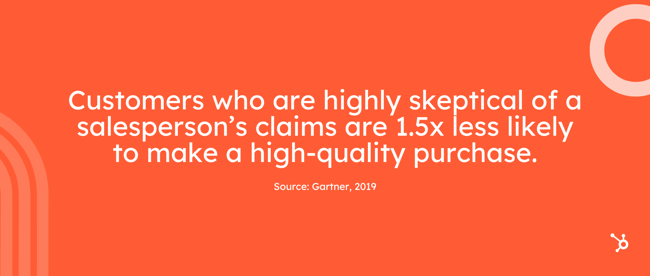
Further reading:
Lying in Sales: 9 Reasons It’s Not Worth Lying to Sell More
9 Tips on How to Say No to Customers the Right Way
15. Always solve for the customer.
Similarly, don't oversell your customer on services or features they don't need, just to bump up your number. A consultative selling approach allows you to be honest with your customer about what they really need to solve for their business. It's the right thing to do and you might be surprised how much it will benefit you when it comes to renewals and referrals.
Further reading:
The Ultimate Guide to Sales Demos That Close Prospects
Solution Selling: The Ultimate Guide
.png)
Free Sales Closing Guide
An easy-to-use sales closing guide with three tactics you can use right away.
- Using an ROI calculator for your prospects
- How to ask confirmation questions
- Sales question templates you can use today
- And more!
16. Roll with rejection.
You won't win every deal, and some buyers just won't like you. That's part of being in sales. And while it's important to be thoughtful about how you can improve, it's crucial to move on easily from rejection.
Experts suggest viewing rejection as proof you're pushing the limits. So, examine why you weren't successful with your prospect, ask for outside opinions when appropriate, and move forward quickly and positively to bigger and better deals.
Further reading: A Proven 4-Step Process for Handling Sales Objections
17. Always ask for referrals.
Successful salespeople know the easiest close often comes from a referral. Sales pro, Marc Wayshack, recommends asking for one introduction every day. The social proof is already there, initial outreach is direct, and sales cycles are often shorter. Once you've successfully closed, always ask for a referral and follow up quickly on those leads.
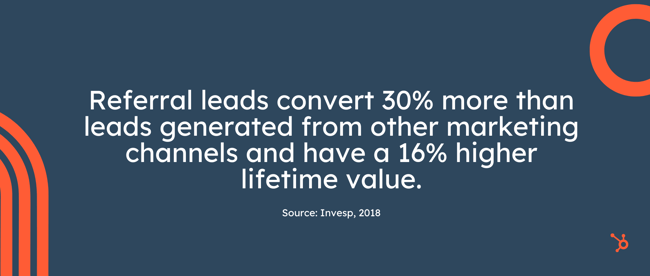
Further reading: 8 Powerful Referral Strategies That Will SuperchargeYour Sales, According to Sales Insight Lab's Founder
Life Habits of Effective Reps
18. Stay balanced.
Salespeople experience more highs and lows in a single week than most professionals do in an entire month. Some days, you feel invincible. Other days, you wonder if you even belong in sales.
Successful reps have learned to manage their emotions and stay somewhere in the middle. When things are going really well and almost all of their deals are closing, they remind themselves not to get too cocky. When business dies down, they tell themselves not to become demoralized: sales will pick up soon if they keep chugging.
Further reading:
12 Ways to Keep Sales Stress from Taking Over Your Life
9 Stats That Prove Your Mood Can Impact Sales Performance
19. Take breaks.
In sales, activity is often correlated with results. The more emails you send, the more meetings you book. The more meetings you book, the more demos you set. The more demos you set, the more deals you close.
Following this line of thought, many salespeople end up working 10-hour days every weekday and even putting in time on the weekends.
Not only is this bad for your mental and physical health, it's also unproductive. As Basecamp founder and CTO David Heinemeier Hansson points out in this fantastic piece on workaholism, some of the highest-achieving people in history — like Kobe Bryant, LeBron James, Charles Dickens, and Charles Darwin — prioritized sleep and a balanced schedule.
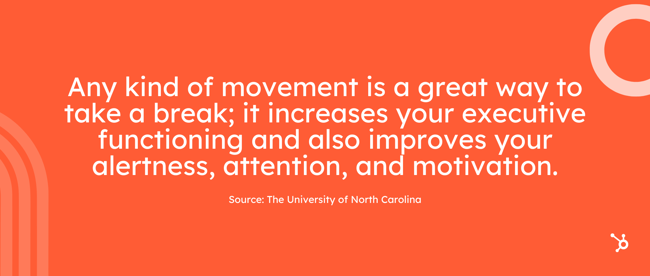
If you're regularly burning the candle at both ends, you'll eventually burn out. Plus, how much are you actually getting done between 6:30 and 8:30 at night? That time would be better spent reading, talking to your friends or family, watching TV, playing video games, cooking, walking your dog — basically, anything that gives your brain a break.
Further reading: 6 Strategies Salespeople Can Use to Recover From Burnout
20. Get eight or more hours of sleep.
Think you can get away with five or six hours of sleep? Think again. According to the American Academy of Sleep Medicine, most adults need seven to eight hours of sleep per night. If you get less, you’ll suffer from a laundry list of ailments, including:
- Irritability
- Decreased motivation
- Anxiety
- Symptoms of depression
- Distractibility
- Reduced energy
- Fatigue
- Restlessness
- Poor decision making
- Increased errors
- Forgetfulness
To be at your best on sales calls, prioritize your sleep.
Further reading: 7 Habits of Highly Effective People [Summary & Takeaways]
Motivation Habits of Effective Reps
21. Believe in what you’re selling.
It’s easier to be passionate about — and sell — a product when you genuinely believe in it. The most effective salespeople actually use their product and believe in its value.
If you feel “meh” about what you’re selling, find happy testimonials from customers. Examples of how your product has improved people’s lives — in ways both large and small — will keep you motivated and engaged (and give you valuable social proof when you’re meeting with prospects).

Further reading: 15 Unique Characteristics of Top-Selling Salespeople
22. Identify your strongest motivator.
It doesn’t matter what drives a salesperson — they simply need to be motivated. Every top salesperson has a burning reason for showing up to work every day and giving it their all. Maybe they want to buy a house and must make at least 110% of quota every month. Maybe they’re super competitive and always want to be at the top of the leaderboard. Maybe they need to prove to themselves that they can do well in sales.
Ask yourself, “What’s my #1 reason for wanting to be successful?” If you can’t immediately come up with an answer, you need to find that motivator.
Further reading:
The 24 Best Motivational Speeches Our Employees Have Ever Heard
19 of the Most Motivational Videos to Inspire Your Sales Team in 2023
.png)
Free Sales Closing Guide
An easy-to-use sales closing guide with three tactics you can use right away.
- Using an ROI calculator for your prospects
- How to ask confirmation questions
- Sales question templates you can use today
- And more!
23. View your customer’s success as your own.
Salespeople don’t stop working as soon as the prospect signs on the dotted line. Instead, top reps touch base frequently with their customers to seek feedback and provide tactical suggestions. Customer success lets reps know what strategies work, forms client relationships, and drives customer advocacy for your business.
Further reading: 12 Customer Satisfaction Metrics You Should Be Monitoring in 2023
Life Habits of Effective Reps
24. Build personal relationships.
Dan Tyre, one of the best salespeople I know, is a relationship builder. Tyre connects with people everywhere he goes — not in the surface-level, LinkedIn way, or the “let’s exchange business cards” way, but in a genuine, human way that makes you want to talk to him again.

As a salesperson, relationships are your capital. You don’t need Don Draper levels of charisma; on the contrary, a desire to help goes a lot further than a magnetic personality.
Further reading:
38 Fun Corporate Team-Building Activities & Outing Ideas Everyone Will Enjoy
45 Quotes That Celebrate Teamwork, Hard Work, and Collaboration
25. They prepare ahead of time.
An effective salesperson prepares before a call. That means they do research on their prospect and gather all the information they need before a big customer meeting.
Top reps don't wing it. They go in with a plan and a contingency plan. This way, they anticipate challenges or questions and prepare an effective response to avoid losing the sale.
Further reading:
28 Questions to Ask on a Discovery Call During the Sales Process
7 Sales Voicemail Mistakes + How to Recover [Advice from HubSpot Sales Reps]
9 Sales Pitch Examples (Plus Tips on How to Write Your Own)
26. Look for potential customers wherever you go.
To over-perform, you can’t stop being a salesperson as soon as you leave the office. Successful reps are always looking for potential customers — at parties, networking events, dinners, and so on.
Of course, you have to read the room. Should you deliver a five-minute speech about the importance of life insurance at your Cousin Jack’s memorial? Definitely not. But if you’re talking to your new friend Greta, and she mentions she’s in the market for life insurance, give her some handy pointers and let her know you’d be happy to talk more in-depth.
Further reading:
The 13 Best Networking Apps Every Sales Professional Needs
Making the Most of Virtual Networking [+How to Get it Right]
Put these Habits into Practice
There’s not one single way to become a good salesperson, but the habits mentioned above are essential to providing a positive sales experience to your customers. Demonstrating that you have passion, knowledge, self-determination, and adaptability can take you from an average sales rep to a high-performing success story.
Editor's note: This post was originally published in May 2021 and has been updated for comprehensiveness.
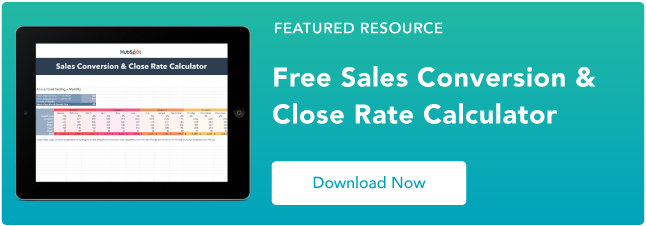
![How Top Salespeople Spend Their Time Outside of the Office [Infographic]](https://blog.hubspot.com/hubfs/00-Blog_Thinkstock_Images/top-performing-salespeople-weekends.jpg)






